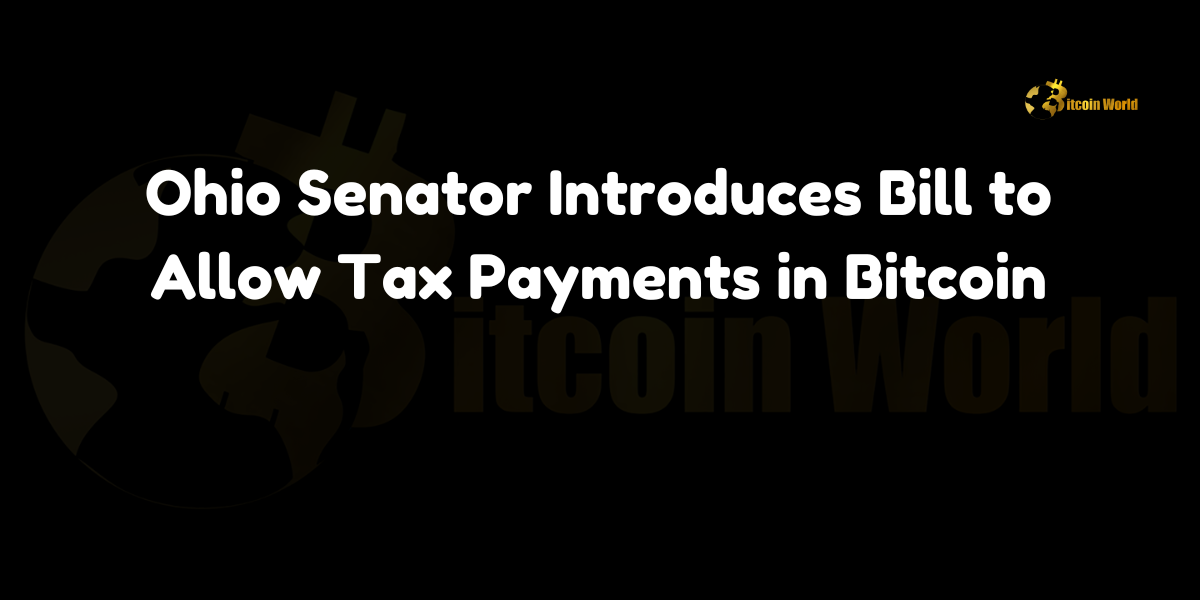Ohio Senator Introduces Bill to Allow Tax Payments in Bitcoin
In a significant move towards broader adoption of digital assets, Ohio State Senator Niraj Antani introduced a bill on September 30, 2024, that would allow Ohio residents and businesses to pay their taxes using cryptocurrencies, including Bitcoin. This legislation marks a pivotal step in integrating digital currencies into everyday financial transactions, aiming to make Ohio a leader in the adoption of blockchain technology.
Senator Antani’s bill is not just about Bitcoin but includes other cryptocurrencies as well. The move is expected to modernize Ohio’s tax payment system and cater to the growing number of individuals and businesses involved in the crypto market. The news was confirmed through an X post by Bitcoin Magazine, which highlighted the significance of this development.
Ohio’s History with Bitcoin Payments
Ohio is not new to the idea of allowing Bitcoin for tax payments. In 2018, the state briefly accepted Bitcoin for tax payments via the platform OhioCrypto.com, making Ohio the first state to offer this option. However, the program was suspended in 2019 due to regulatory concerns raised by the Ohio Attorney General’s Office.
Senator Antani’s new bill seeks to revive this idea with a more robust framework that addresses previous concerns, aiming to ensure regulatory compliance while promoting innovation in digital finance.
How the Bill Would Work
If passed, the bill would allow individuals and businesses to pay taxes, including income taxes, sales taxes, and property taxes, using Bitcoin and potentially other cryptocurrencies. The payments would likely be converted to U.S. dollars at the time of the transaction, ensuring that the state treasury remains unaffected by the volatility of digital assets.
The state would work with an approved payment processor to handle the conversion of cryptocurrencies into dollars. This model is similar to the systems used by companies like BitPay, which allow users to pay in cryptocurrencies but ensure that the recipient receives fiat currency, mitigating the risks associated with crypto’s price fluctuations.
Senator Antani’s Vision for Ohio
Senator Niraj Antani, a vocal supporter of blockchain technology and cryptocurrencies, introduced the bill with the vision of making Ohio a more crypto-friendly state. In his view, integrating cryptocurrencies into government services such as tax payments will encourage broader adoption and drive innovation in the financial sector.
“Allowing tax payments in Bitcoin and other cryptocurrencies is the logical next step for Ohio,” Antani said in a statement. “We need to embrace this transformative technology and ensure that our state is positioned to benefit from the growth of the digital asset economy.”
The bill comes at a time when cryptocurrency adoption is increasing across the U.S., with states like Florida, Texas, and Wyoming also making strides toward becoming more crypto-friendly.
Broader Implications for Cryptocurrency Adoption
If Ohio successfully implements this crypto tax payment system, it could lead to a broader wave of adoption across other U.S. states. The move could set a precedent for how states handle cryptocurrencies, especially in the realm of public services and tax collection.
For crypto enthusiasts and businesses operating in the digital asset space, the ability to pay taxes in Bitcoin would provide more flexibility and convenience. It could also lead to an increase in institutional interest, as businesses may feel more confident in using cryptocurrencies for day-to-day operations if government agencies start accepting them as valid payment options.
Moreover, the potential success of this legislation could influence federal policymakers as they consider broader regulations around cryptocurrencies. The Internal Revenue Service (IRS) has already been ramping up its focus on cryptocurrency tax compliance, and moves like Ohio’s could push the conversation about crypto regulation and adoption to the national stage.
Potential Challenges
While the bill is a positive development for the crypto industry, there are still potential challenges ahead. For one, the volatility of cryptocurrencies like Bitcoin might make it difficult for the state to accurately calculate tax obligations without sophisticated systems for real-time price conversion.
Additionally, concerns about security and fraud prevention would need to be addressed, particularly in light of the increasing number of hacks and scams targeting the crypto sector. The state would have to work closely with payment processors and security firms to ensure that transactions are secure and that taxpayers’ funds are protected.
What’s Next for the Bill?
The bill will now go through the legislative process in Ohio’s General Assembly. It will likely face debate and potential amendments as lawmakers assess the benefits and challenges of integrating cryptocurrencies into the state’s tax system.
If the bill passes, Ohio could become one of the first states to officially allow crypto tax payments, positioning itself as a leader in the blockchain space. This move would not only boost crypto adoption within the state but could also attract crypto businesses and startups looking for a friendly regulatory environment.
Conclusion: A Step Towards Modernizing Ohio’s Financial System
Senator Niraj Antani’s introduction of the cryptocurrency tax payment bill is a bold step toward modernizing Ohio’s financial system. By allowing taxes to be paid in Bitcoin and other digital assets, Ohio could become a pioneer in embracing the digital currency revolution.
This initiative, if passed, could set an example for other states and potentially influence national crypto policy. For now, the crypto community will be watching closely as the bill progresses through Ohio’s legislative channels.
Internal Link Reference
For more updates on how cryptocurrency regulations are evolving across the U.S., explore our latest analysis on state-level crypto policies, where we discuss the most recent developments and their implications for investors and businesses.
Disclaimer: The information provided is not trading advice, Bitcoinworld.co.in holds no liability for any investments made based on the information provided on this page. We strongly recommend independent research and/or consultation with a qualified professional before making any investment decisions.

